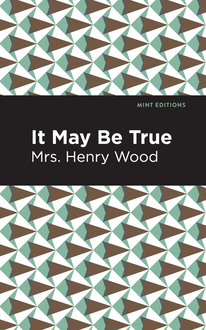-
 Univers
Univers
-
 Ebooks
Ebooks
-
 Livres audio
Livres audio
-
 Presse
Presse
-
 Podcasts
Podcasts
-
 BD
BD
-
 Documents
Documents
-
- Cours
- Révisions
- Ressources pédagogiques
- Sciences de l’éducation
- Manuels scolaires
- Langues
- Travaux de classe
- Annales de BEP
- Etudes supérieures
- Maternelle et primaire
- Fiches de lecture
- Orientation scolaire
- Méthodologie
- Corrigés de devoir
- Annales d’examens et concours
- Annales du bac
- Annales du brevet
- Rapports de stage
La lecture à portée de main
Vous pourrez modifier la taille du texte de cet ouvrage
Découvre YouScribe en t'inscrivant gratuitement
Je m'inscrisDécouvre YouScribe en t'inscrivant gratuitement
Je m'inscrisEn savoir plus
Vous pourrez modifier la taille du texte de cet ouvrage
En savoir plus

Description
The Channings: A Story (1862) is a novel by Mrs. Henry Wood. Written towards the beginning of her career as a leading English novelist of the Victorian era, The Channings: A Story is a sweeping exploration of religion, society, crime, and the bonds of brotherhood. Blending several literary genres, including mystery, Gothic, and romance, Wood’s novel is a masterful and underappreciated work of fiction that remains essential nearly two centuries after it was published. The novel opens with a church service, an elaborate ceremony performed under the watchful eye of the Reverend John Pye. Following a mediocre choir performance, Pye enters the vestry to discover a commotion involving a prank played on Bywater, whose surplice had been covered in ink by a devious, unidentified culprit. Soon after, the reader is introduced to the Channing brothers. Charley, the younger, is a bookish preteen who undergoes extensive bullying and is referred to as “Miss Channing” by the other boys. His brother, Tom, is a senior at their school who wields his power over his brother while defending him when the need arises. Wood’s novel follows these youths into adulthood, tracing their growth into young men in a society grounded in faith and perseverance. When one brother is accused of a serious crime, the other—believing him to be guilty—takes his place. Forced to reassess their relationship by the extent of his sibling’s sacrifice, the other must find out who committed the theft in order to free his savior and to restore the Channing family reputation. The Channings: A Story is a powerful novel by an author with a deep understanding of English society, the pressures of boyhood, and the common values capable of holding loved ones together. With a beautifully designed cover and professionally typeset manuscript, this edition of Mrs. Henry Wood’s The Channings: A Story is a classic work of English literature reimagined for modern readers.
Sujets
Informations
| Publié par | Mint Editions |
| Date de parution | 14 mai 2021 |
| Nombre de lectures | 0 |
| EAN13 | 9781513286105 |
| Langue | English |
| Poids de l'ouvrage | 1 Mo |
Informations légales : prix de location à la page 0,0550€. Cette information est donnée uniquement à titre indicatif conformément à la législation en vigueur.
Extrait
The Channings
A Story
Mrs. Henry Wood
The Channings: A Story was first published in 1862.
This edition published by Mint Editions 2021.
ISBN 9781513281087 | E-ISBN 9781513286105
Published by Mint Editions®
minteditionbooks.com
Publishing Director: Jennifer Newens
Design & Production: Rachel Lopez Metzger
Project Manager: Micaela Clark
Typesetting: Westchester Publishing Services
I remember the gleams and glooms that dart
Across the schoolboy’s brain;
The song and the silence in the heart,
That in part are prophecies, and in part
Are longings wild and vain.
And the voice of that fitful song
Sings on and is never still:
“A boy’s will is the wind’s will,
And the thoughts of youth are long, long thoughts.”
Strange to me now are the forms I meet
When I visit the dear old town;
But the native air is pure and sweet,
And the trees that o’ershadow each well-known street,
As they balance up and down,
Are singing the beautiful song,
Are sighing and whispering still:
“A boy’s will is the wind’s will,
And the thoughts of youth are long, long thoughts.”
C ONTENTS I. T HE I NKED S URPLICE II. B AD N EWS III. C ONSTANCE C HANNING IV. N O H OLIDAY T O -D AY V. R OLAND Y ORKE VI. L ADY A UGUSTA Y ORKE AT H OME VII. M R . K ETCH VIII. T HE A SSISTANT -O RGANIST IX. H AMISH ’ S C ANDLES X. A F ALSE A LARM XI. T HE C LOISTER K EYS XII. A M ISHAP TO THE B ISHOP XIII. M AD N ANCE XIV. K EEPING O FFICE XV. A S PLASH IN THE R IVER XVI. M UCH TO A LTER XVII. S UNDAY M ORNING AT M R . C HANNING ’ S , AND AT L ADY A UGUSTA ’ S XVIII. M R . J ENKINS A LIVE A GAIN XIX. T HE L OSS XX. T HE L OOMING OF AN A WFUL F EAR XXI. M R . B UTTERBY XXII. A N I NTERRUPTED D INNER XXIII. A N E SCORT TO THE G UILDHALL XXIV. T HE E XAMINATION XXV. A M ORNING C ALL XXVI. C HECKMATED XXVII. A P IECE OF P REFERMENT XXVIII. A N A PPEAL TO THE D EAN XXIX. A T ASTE OF “T AN ” XXX. T HE D EPARTURE XXXI. A BROAD XXXII. A N O MINOUS C OUGH XXXIII. N O S ENIORSHIP FOR T OM C HANNING XXXIV. G ERALD Y ORKE M ADE INTO A “B LOCK ” XXXV. T HE E ARL OF C ARRICK XXXVI. E LLEN H UNTLEY XXXVII. T HE C ONSPIRATORS XXXVIII. T HE D ECISION XXXIX. T HE G HOST XL. M R . K ETCH ’ S E VENING V ISIT XLI. T HE S EARCH XLII. A N O FFICIAL C EREMONY I NTERRUPTED XLIII. D RAGGING THE R IVER XLIV. M R . J ENKINS IN A D ILEMMA XLV. A N EW S USPICION XLVI. A L ETTER FOR M R . G ALLOWAY XLVII. D ARK C LOUDS XLVIII. M UFFINS FOR T EA XLIX. A C HÂTEAU E N E SPAGNE L. R EALLY G ONE ! LI. A N A RRIVAL IN A F LY LII. A R ELIC FROM THE B URIAL -G ROUND LIII. T HE R ETURN H OME LIV. “T HE S HIP ’ S D ROWNED ” LV. N EWS FROM R OLAND LVI. T HE B ROKEN P HIAL LVII. A G HOST A GAIN LVIII. B YWATER ’ S D ANCE LIX. R EADY LX. I N W HAT D OES IT L IE ?
I
T HE I NKED S URPLICE
The sweet bells of Helstonleigh Cathedral were ringing out in the summer’s afternoon. Groups of people lined the streets, in greater number than the ordinary business of the day would have brought forth; some pacing with idle steps, some halting to talk with one another, some looking in silence towards a certain point, as far as the eye could reach; all waiting in expectation.
It was the first day of Helstonleigh Assizes; that is, the day on which the courts of law began their sittings. Generally speaking, the commission was opened at Helstonleigh on a Saturday; but for some convenience in the arrangements of the circuit, it was fixed this time for Wednesday; and when those cathedral bells burst forth, they gave signal that the judges had arrived and were entering the sheriff’s carriage, which had gone out to meet them.
A fine sight, carrying in it much of majesty, was the procession, as it passed through the streets with its slow and stately steps; and although Helstonleigh saw it twice a year, it looked at it with gratified eyes still, and made the day into a sort of holiday. The trumpeters rode first, blowing the proud note of advance, and the long line of well-mounted javelin men came next, two abreast; their attire that of the livery of the high sheriff’s family, and their javelins held in rest. Sundry officials followed, and the governor of the county gaol sat in an open carriage, his long white wand raised in the air. Then appeared the handsome, closed equipage of the sheriff, its four horses, caparisoned with silver, pawing the ground, for they chafed at the slow pace to which they were restrained. In it, in their scarlet robes and flowing wigs, carrying awe to many a young spectator, sat the judges. The high sheriff sat opposite to them, his chaplain by his side, in his gown and bands. A crowd of gentlemen, friends of the sheriff, followed on horseback; and a mob of ragamuffins brought up the rear.
To the assize courts the procession took its way, and there the short business of opening the commission was gone through, when the judges re-entered the carriage to proceed to the cathedral, having been joined by the mayor and corporation. The sweet bells of Helstonleigh were still ringing out, not to welcome the judges to the city now, but as an invitation to them to come and worship God. Within the grand entrance of the cathedral, waiting to receive the judges, stood the Dean of Helstonleigh, two or three of the chapter, two of the minor canons, and the king’s scholars and choristers, all in their white robes. The bells ceased; the fine organ pealed out—and there are few finer organs in England than that of Helstonleigh—the vergers with their silver maces, and the decrepit old bedesmen in their black gowns, led the way to the choir, the long scarlet trains of the judges held up behind: and places were found for all.
The Rev. John Pye began the service; it was his week for chanting. He was one of the senior minor canons, and head-master of the college school. At the desk opposite to him sat the Rev. William Yorke, a young man who had only just gained his minor canonry.
The service went on smoothly until the commencement of the anthem. In one sense it went on smoothly to the end, for no person present, not even the judges themselves, could see that anything was wrong. Mr. Pye was what was called “chanter” to the cathedral, which meant that it was he who had the privilege of selecting the music for the chants and other portions of the service, when the dean did not do so himself. The anthem he had put up for this occasion was a very good one, taken from the Psalms of David. It commenced with a treble solo; it was, moreover, an especial favourite of Mr. Pye’s; and he complacently disposed himself to listen.
But no sooner was the symphony over, no sooner had the first notes of the chorister sounded on Mr. Pye’s ear, than his face slightly flushed, and he lifted his head with a sharp, quick gesture. That was not the voice which ought to have sung this fine anthem; that was a cracked, passée voice, belonging to the senior chorister, a young gentleman of seventeen, who was going out of the choir at Michaelmas. He had done good service for the choir in his day, but his voice was breaking now; and the last time he had attempted a solo, the bishop (who interfered most rarely with the executive of the cathedral; and, indeed, it was not his province to do so) had spoken himself to Mr. Pye on the conclusion of the service, and said the boy ought not to be allowed to sing alone again.
Mr. Pye bent his head forward to catch a glimpse of the choristers, five of whom sat on his side of the choir, the decani ; five on the opposite, or cantori side. So far as he could see, the boy, Stephen Bywater, who ought to have taken the anthem, was not in his place. There appeared to be only four of them; but the senior boy with his clean, starched surplice, partially hid those below him. Mr. Pye wondered where his eyes could have been, not to have noticed the boy’s absence when they had all been gathered round the entrance, waiting for the judges.
Had Mr. Pye’s attention not been fully engrossed with his book, as the service had gone on, he might have seen the boy opposite to him; for there sat Bywater, before the bench of king’s scholars, and right in front of Mr. Pye. Mr. Pye’s glance fell upon him now, and he could scarcely believe it. He rubbed his eyes, and looked, and rubbed again. Bywater there! and without his surplice! braving, as it were, the head-master! What could he possibly mean by this act of insubordination? Why was he not in his place in the school? Why was he mixing with the congregation? But Mr. Pye could as yet obtain no solution to the mystery.
The anthem came to an end; the dean had bent his brow at the solo, but it did no good; and, the prayers over, the sheriff’s chaplain ascended to the pulpit to preach the sermon. He selected his text from St. John’s Gospel: “That which is born of the flesh is flesh, and that which is born of the Spirit is spirit.” In the course of his sermon he pointed out that the unhappy prisoners in the gaol, awaiting the summons to answer before an earthly tribunal for the evil deeds they had committed, had been led into their present miserable condition by the seductions of the flesh. They had fallen into sin, he went on, by the indulgence of their passions; they had placed no restraint upon their animal appetites and guilty pleasures; they had sunk gradually into crime, and had now to meet the penalty of the law. But did no blame, he asked, attach to those who had remained indifferent to their downward course; who had never stretched forth a friendly hand to rescue them from destruction; who had made no effort to teach and guide in the ways of truth and righteousness these outcasts of society? Were we, he demanded, at liberty to ignore our responsibility by asking in the words of earth’s first criminal, “Am I my brother’s keeper?” No; it was at once our duty and our privilege to engage in the noble work of man’s reformation—to raise the fallen—to seek out the lost, and to restore the outcast; and this, he argued, coul
-
 Univers
Univers
-
 Ebooks
Ebooks
-
 Livres audio
Livres audio
-
 Presse
Presse
-
 Podcasts
Podcasts
-
 BD
BD
-
 Documents
Documents
-
Jeunesse
-
Littérature
-
Ressources professionnelles
-
Santé et bien-être
-
Savoirs
-
Education
-
Loisirs et hobbies
-
Art, musique et cinéma
-
Actualité et débat de société
-
Jeunesse
-
Littérature
-
Ressources professionnelles
-
Santé et bien-être
-
Savoirs
-
Education
-
Loisirs et hobbies
-
Art, musique et cinéma
-
Actualité et débat de société
-
Actualités
-
Lifestyle
-
Presse jeunesse
-
Presse professionnelle
-
Pratique
-
Presse sportive
-
Presse internationale
-
Culture & Médias
-
Action et Aventures
-
Science-fiction et Fantasy
-
Société
-
Jeunesse
-
Littérature
-
Ressources professionnelles
-
Santé et bien-être
-
Savoirs
-
Education
-
Loisirs et hobbies
-
Art, musique et cinéma
-
Actualité et débat de société
- Cours
- Révisions
- Ressources pédagogiques
- Sciences de l’éducation
- Manuels scolaires
- Langues
- Travaux de classe
- Annales de BEP
- Etudes supérieures
- Maternelle et primaire
- Fiches de lecture
- Orientation scolaire
- Méthodologie
- Corrigés de devoir
- Annales d’examens et concours
- Annales du bac
- Annales du brevet
- Rapports de stage
















